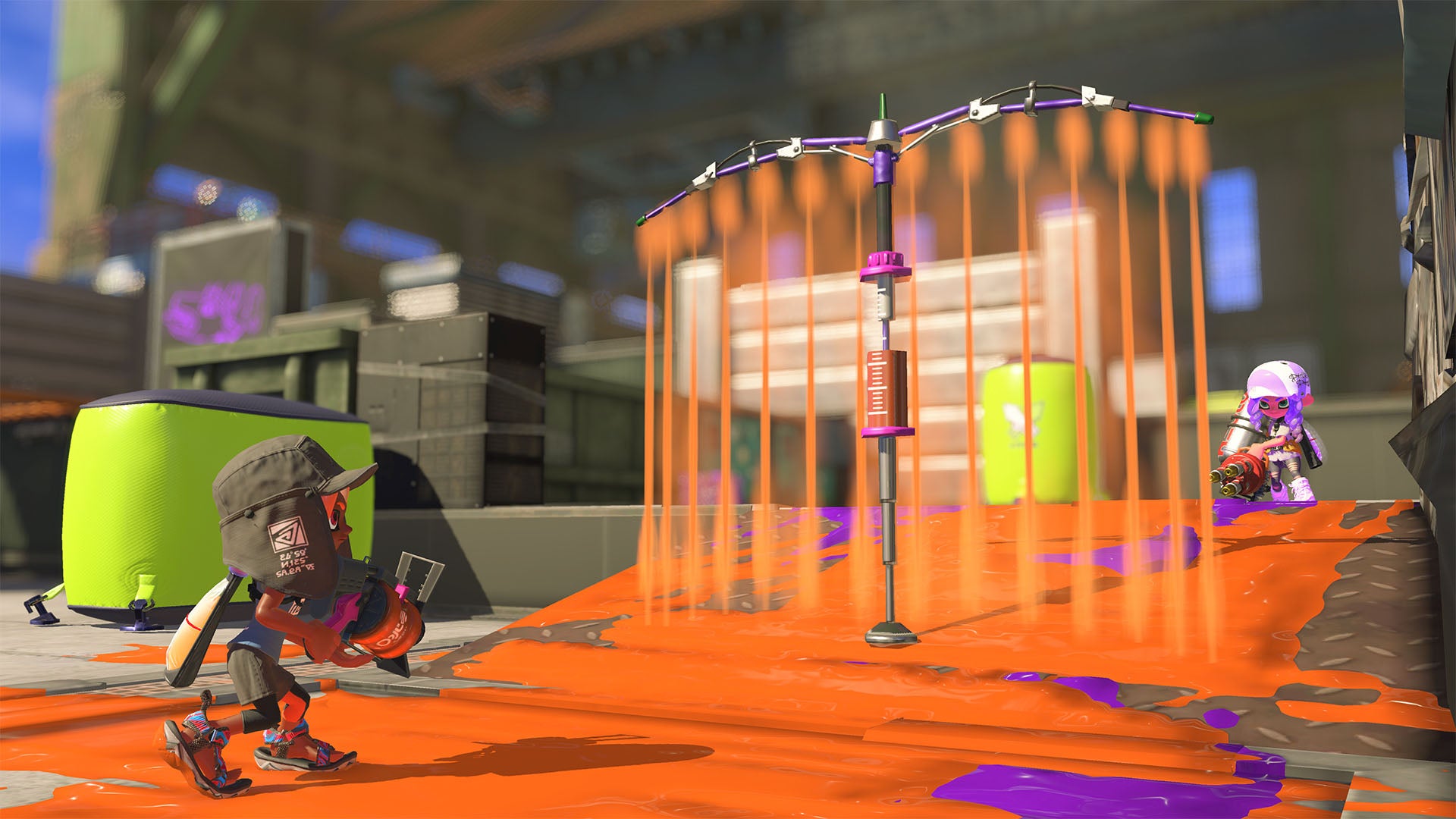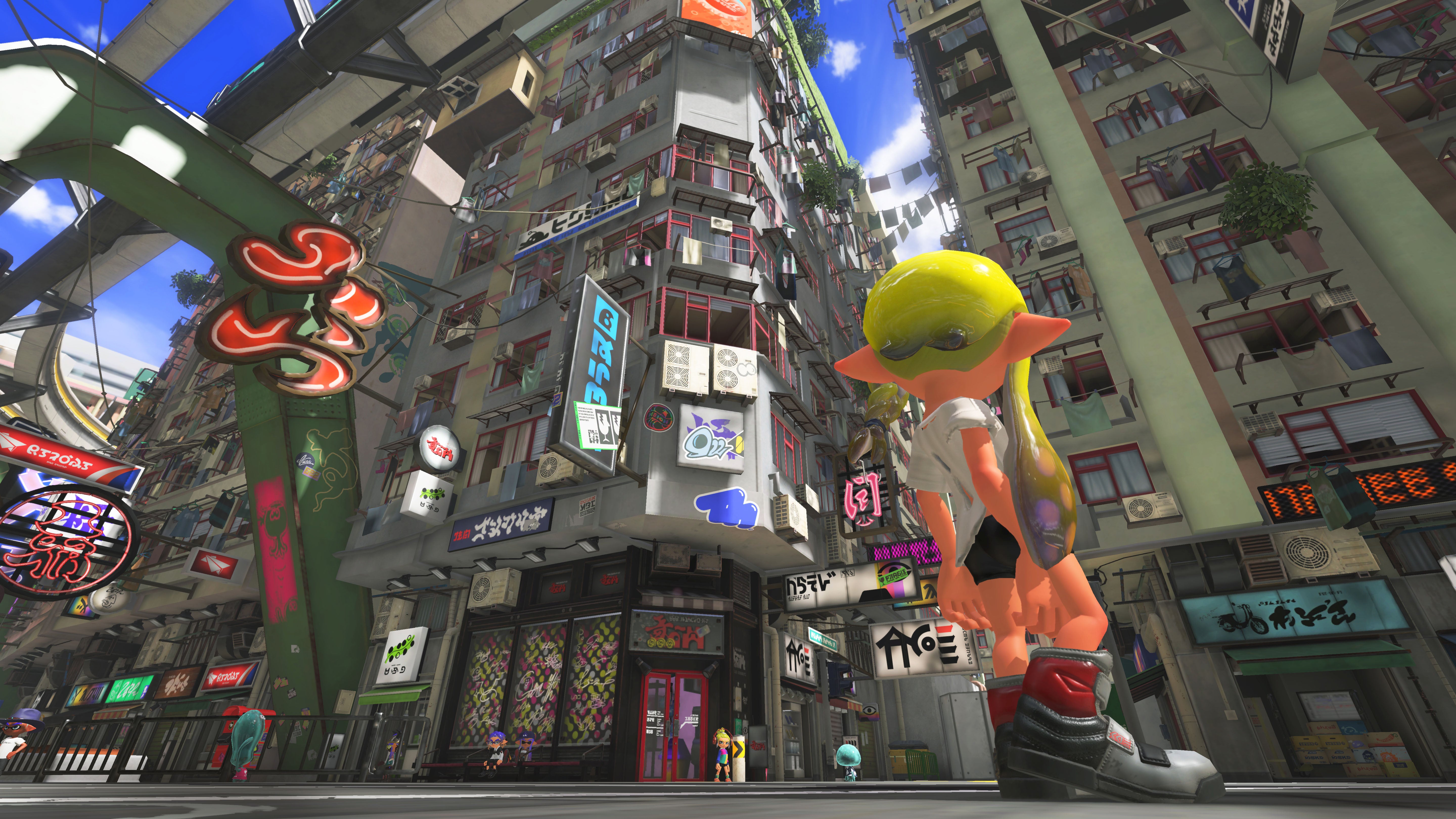To put it another way, jumping from Splatoon 2 to this latest sequel is more like renovating a beloved old house rather than outright moving. That leads to a natural early conclusion of this review, and it’s a time-honored cliche: if you liked old Splatoon, you’ll love this! It’s like that, but better! Well, duh. Obviously. This also means that the sentiment expressed in the preview carries over here; it’s a difficult game to review. I could get into the minutiae of things like new weapons, new fashion looks, a barnstorming new mode in the form of the three-way turf war, or the improved Salmon Run mode, for instance. But then I’m waxing lyrical for thousands of words getting into tight specifics that, honestly, the hardcore probably already know, having voraciously consumed pre-release content, and the casual probably don’t particularly care to know. So let me take another tack. Let me put it in the simplest of terms: Splatoon 3 is the best Splatoon yet. It’s rich with modes, with customization, and still carries the frenzied, punky attitude that made the original stand out well. That attitude is the sort of thing that risks fading away with success - but it’s still present here, three games in. I’m going to play a hell of a lot of this game. The largest single element of Splatoon 3 that stands most apart from its predecessors is its story mode, which is far more fleshed out than I’d initially anticipated. It’s the most expansive attempt at both storytelling and single-player entertainment that the series has managed to date – and for the most part, it comes off swimmingly. The element of the story mode that works unreservedly is the stage design and the general flow of the narrative. From the game’s main hub, where multiplayer and customization is accessed, you hop down a sewer grate to start the story component. This ultimately drops you into another hub, a world overtaken by thick purple slime that cannot be splatted away with your ink alone. Simply, you have to hop into self-enclosed stages in order to gather the resources needed to clear away this slime. It all feels a bit Mario Sunshine, in a sense. The blockages get cleared in sections, unlocking more of the hub to explore, which in turn opens up containers of loot in the form of customization gear and more stage entrances. After initial levels, there’s even neat non-linearity in terms of the order you enter stages. The stages themselves are where I was most surprised. There’s a good mix here. Many of the early stages function as tutorials for how various weapons and concepts of Splatoon work - you will leave the campaign far better equipped for heading online without shaming yourself performance-wise after playing it. But beyond that, this is more than tutorial fodder - it quickly evolves into interesting and unique challenges, each of them testing various elements of Splatoon’s gameplay systems. Some levels are mini-puzzles, while some are more about combat and splatting enemies. I really enjoyed it a great deal, whereas in past games I skipped right to the multiplayer. As you progress through the levels, a storyline develops that will leave those truly wired into the Splatoon universe happy indeed. There’s little nuggets of lore here that will thrill – though throughout, I couldn’t help but wish the story was delivered with a little more flair than a bunch of ongoing text boxes with any more lavish presentation reserved for just a few scenes. Despite impressive level and mission design, and a strong hub to launch to those levels from, in this sense one can still tell that the single-player is a secondary part of Splatoon 3’s identity. And the rest? Well, it’s so far, so Splatoon. There is new stuff here, of course, headlined by the new ‘tricolor’ three-way turf war that ups the ante by adding an extra team into the mix, where at the halfway point of a Splatfest the two losing teams will gang up on the third, who has to defend. It’s an interesting concept, though in the little I played of it during the online beta ‘Splatfest’ suggests it needs a little fine-tuning. That’s the thing, really. Splatoon 3 doesn’t feel all that new a lot of the time – it just feels like a sharper, slicker, better-looking version of what came before. The story mode is the exception to that. There’s nothing wrong with being iterative, of course – arguably, Nintendo doesn’t do that often enough, and sometimes tosses the baby out with the bathwater as a result. Splatoon 3 is the opposite: it keeps everything that made the previous games great, and simply evolves, iterates, and tweaks to provide something even better. As a result, Splatoon 3 is hands-down the best Splatoon game – I just wish it was a little more new-feeling. With a Splatoon game pre-release, there are unknowns, too. I played in the open-to-the-public Splatfest, and Nintendo also had a couple of days worth of online sessions available to the media. But that’s barely anything, and so I need to see how online fares. Built on the foundation of Splatoon 2, it should be fine, mind. And then there’s updates. Both previous games had surprisingly strong online offerings – and it’s possible this third game’s lack of new ideas might be addressed in the coming months, as Splatoon 3 embraces its nature as a rolling service game. Regardless, though, the launch day package is a definitive Splatoon offering – and a very easy recommendation.


.jpg/BROK/resize/690%3E/format/jpg/quality/70/splatoon_3-(22).jpg)